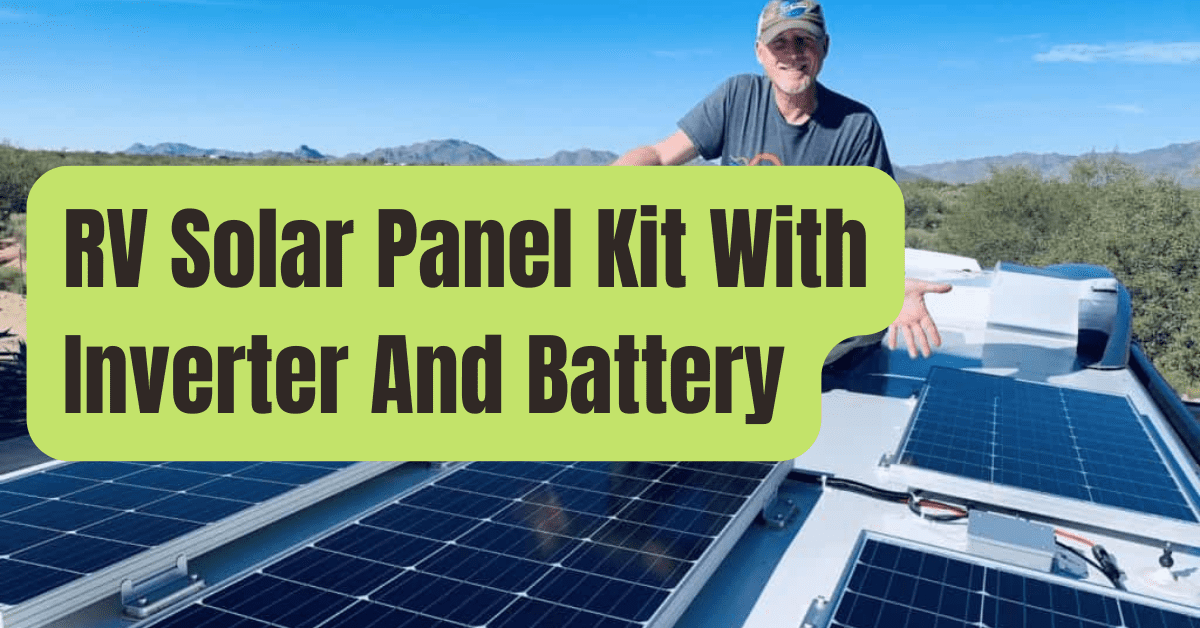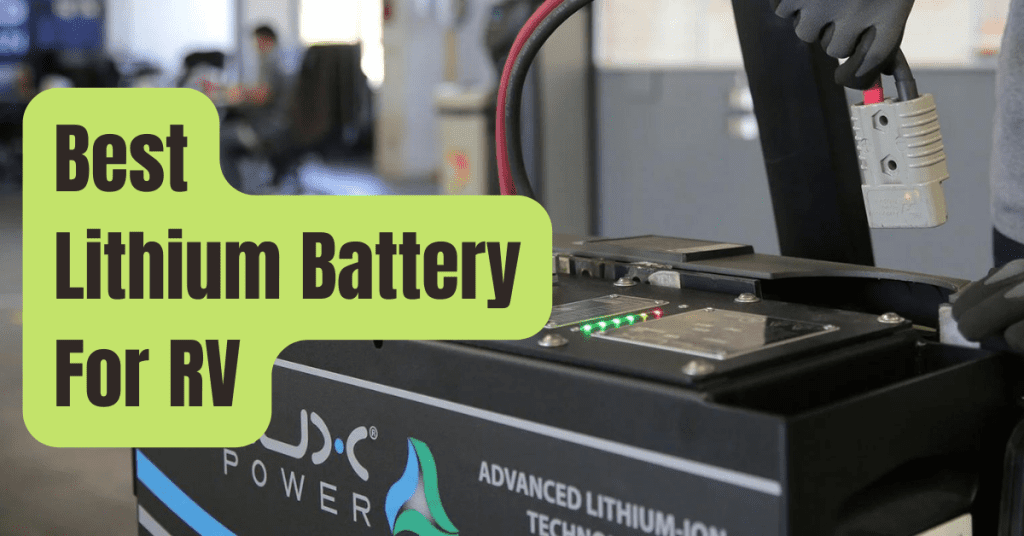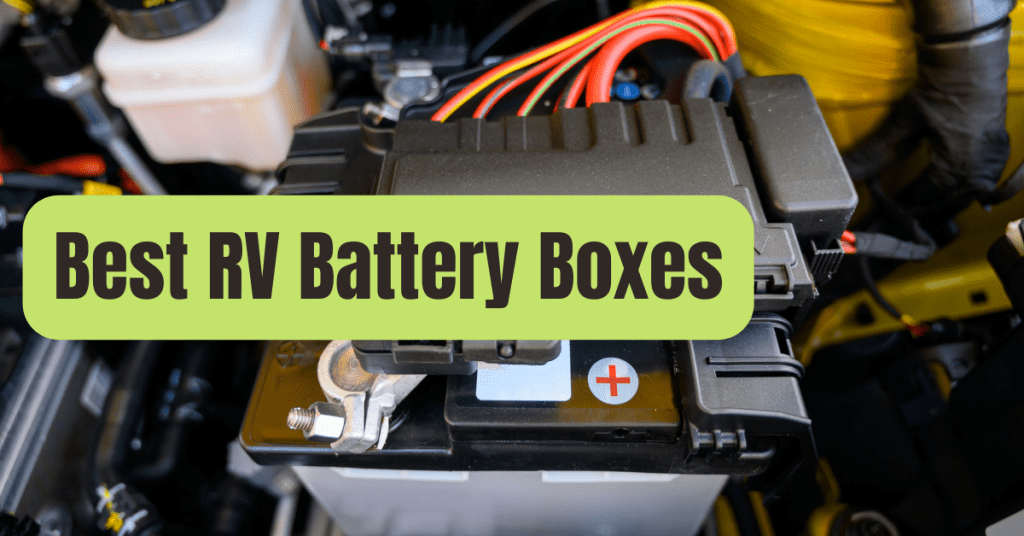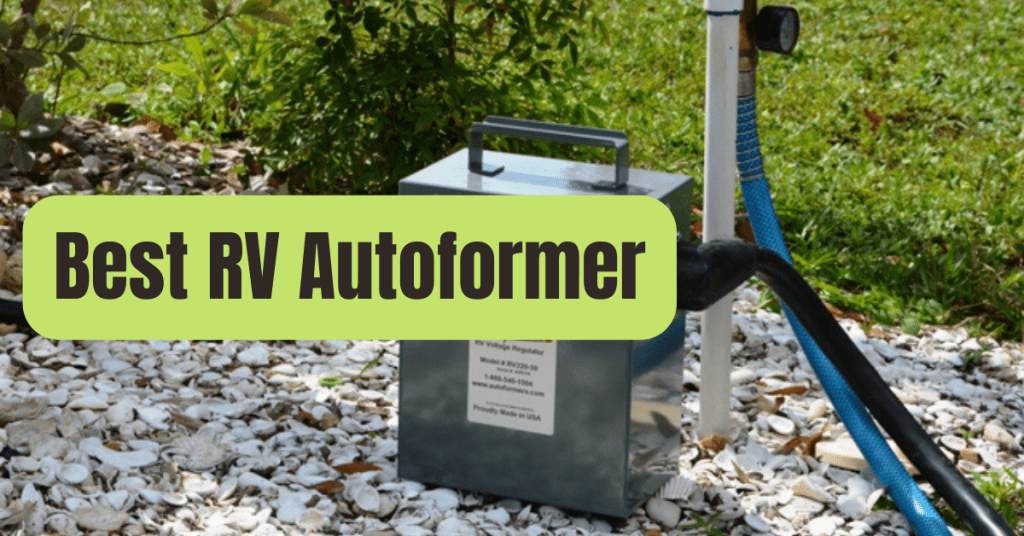Did you know that the price of a complete solar system is decreasing annually? However, RV solar kits are far less expensive than a complete solar system and available in a variety of sizes and features.
If you’re having trouble deciding which RV solar kit is perfect for you, this guide should be able to provide you some great suggestions, advice, and strategies.
Best Pick
500W ACOPOWER Kit
Because it is strong, beginner-friendly, and readily expanded, not to mention reasonably priced, this kit is our favourite overall.
Reviews of RV Solar Kit
| Product | Name | Details |
| Best Overall Best Overall | ACOPOWER 500W Kit | Our top pick overall since it is durable Beginner-friendly Easy to grow |
| Budget Pick Budget Pick | Renogy 100W Kit With 30A PWM Controller | Accessibility makes it the best choice for a low budget. Inexpensive Great value for the money |
| Best With Inverter + Battery Best With Inverter + Battery | WindyNation 400W Kit | Using a battery and an inverter, our best kit Includes everything you need to get started along with Strong power output |
| Best Wind Solar Kit Best Wind Solar Kit | ECO-WORTHY 1400W Wind Solar Power Kit | It may be used in almost any weather. Simple to install Almost everything you need to get started is included. |
| Best Luxury Kit Best Luxury Kit | Renogy 800W Kit | Because it is so effective, the best luxury solar kit BlueTooth-capable Amazingly high quality |
| WindyNation 400W Kit With 400ah AGM Battery | Installable WindyNation kit now available It is missing an inverter. It features an easy-to-use LCD screen for readouts. | |
| WindyNation 200W Kit With 200ah Battery And Inverter | Include an inverter Power output is not very high. It may be installed and used right away. | |
| Renogy 400W Kit | Dependable and excellent It seems to be missing several expected elements. Bluetooth connectivity is optional. | |
| ECO-WORTHY 800W Complete Kit | An innovative two-in-one inverter and controller are included with ECO-WORTHY. Excellent portability Great potential for conserving space | |
| ECO-WORTHY 200W Kit | ECO-expandability WORTHY’s isn’t very exceptional. Affordable Unexpectedly high caliber | |
| TP-solar 100W Foldable Kit | Not all of an RV can be powered by TP-solar. Very transportable Very useful for little auxiliary equipment | |
| Renogy 200W Foldable Kit | If you don’t want to install a permanent solar system, the foldable kit from Renogy is great. But in contrast It’s expensive and bulky. | |
| SUNGOLDPOWER 200W Kit | Bigger kit at a lower price Outstanding client service Excellent guarantee and top-notch panels | |
| ECO-WORTHY 120W Kit | Large number of cables and brackets One strong panel Lowest possible pricing | |
| WindyNation 200W Kit With 200ah Battery | Inexpensive Ready to install at once The price of some contemporary conveniences | |
| Renogy 200W Kit With 30A PWM Controller | This 200W kit doesn’t differentiate itself from rival products. It is reliable. Full of the quality Renogy is known for |
You can discover all of our in-depth evaluations of the best RV solar kits available right here.
While we wholeheartedly support each of them, we’ve tried to rank them in the order that would best help you in your quest, beginning with the ACOPOWER 500W Kit, which is our top pick overall.
Let’s look more closely.
#1. ACOPOWER 500W Kit (Best Overall)
Specifications
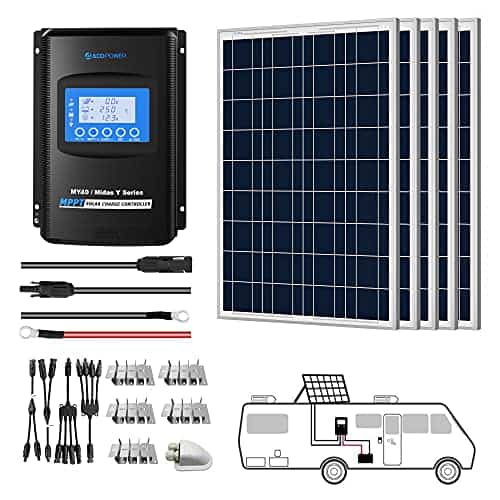
- Wattage: 500 Watts
- Voltage: 12/24 Volts
- Dimensions: 40.25*26.5*1.38 Inch
- Battery Type: lead-acid (Gel, Sealed, Flooded) and Lithium
- LCD Display: Yes
Our top choice overall is the ACOPOWER 500W Kit for a variety of factors.
First of all, since it is well-built, simple to put together, and considerably more powerful than the rating suggests.
Then, this MPPT-controlled system includes five complete panels, a solar charge controller, and all the mounting hardware and wires you could possibly need to get started.
You may connect the panels either in series or parallel, and it works with almost any battery type.
Because of this, it may grow and become much more personalized over time.
We heartily endorse the ACOPOWER 500W Kit as the finest solar kit for RVs available this year.
#2. Renogy 100W Kit With 30A PWM Controller (Budget Pick)
Specifications
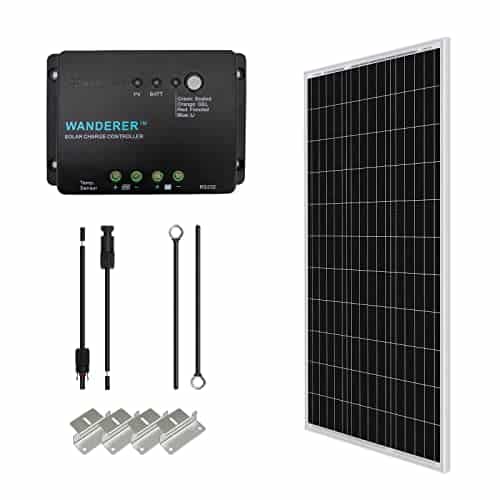
- Wattage: 100 Watts
- Voltage: 12 Volts
- Dimensions:47.01 x 1.5 x 20.87 inches
- Battery Type: Sealed, gel and flooded
- LCD Display: None
Our budget selection from Renogy could be ideal for you if you’re searching for a cheap solar panel kit to begin started.
It comes with everything you need except a battery.
This PWM-powered kit is one of the most effective on our list since it also includes a monocrystalline solar panel! The company claims that this kit can achieve conversion rates of up to 21%, giving you a lot of value for your money.
Given the kit’s already affordable pricing, all of this is really astounding.
After using your money so carefully, it’s impossible not to feel successful.
#3. WindyNation 400W Kit (Best With Inverter + Battery)
Specifications
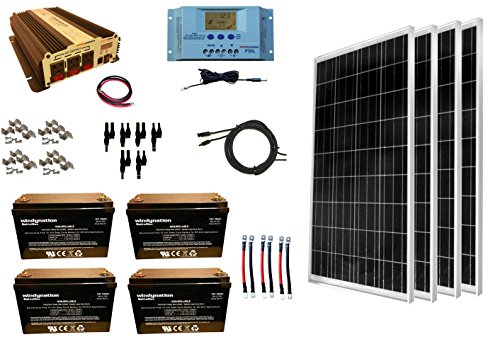
- Wattage: 1500 Watt
- Voltage: 12 v
- LCD Display: Yes
Unlike the most of the kits on this list, this WindyNation kit includes a battery.
The greatest RV solar kit with an inverter and battery on our list, as well as one of the most readily assembled kits, is this 400W kit, which includes four batteries and a suitable inverter.
While the additional batteries in this kit make it a little pricier, buying everything together as a package rather than individually might wind up saving you some money.
In any case, this is a great alternative if you’re looking for something that is ready to use right away and simple to set up.
#4. The ECO-WORTHY 1400W Wind Solar Power Kit (Best Wind Solar Kit)
Specifications
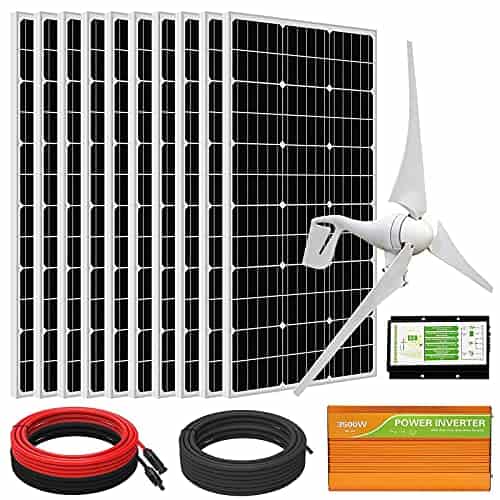
- Wattage: 3500W
- Voltage: 24V-110V
- Weight: 18.96 pounds
- Dimensions: 39.8*20.1*1.4 inch
- IP65 rated junction box
We find it noteworthy that this ECO-WORTHY solar panel set also comes with a wind turbine.
This turbine can be wired into the solar equipment quite easily, and it helps by adding some additional supplemental power on the cloudiest days.
In addition to being the finest wind solar kit on our list, it also comes with a one-year guarantee, giving you a whole 365 days to get used to living off the grid without any danger.
Having a wind turbine is definitely preferable than not having one, despite the fact that it may be challenging to spin unless it’s extremely windy.
#5. Renogy 800W Kit (Best Luxury Kit)
Specifications
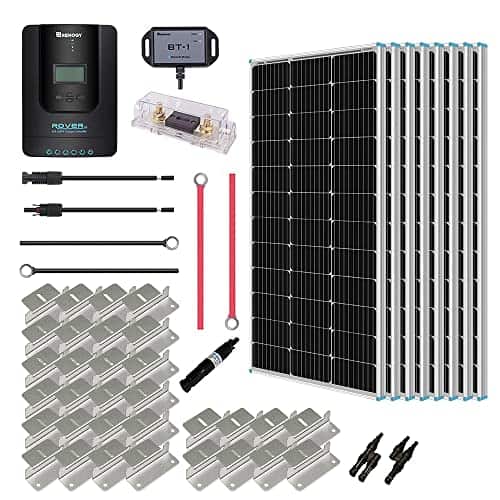
- Wattage: 100 Watt
- Voltage:12 Volt
- Weight: 16.5 pounds
- Dimensions: 42.2 x 19.6 x 1.38 inches
This kit is the top luxury kit on our list since Renogy is a well-known, reliable brand when it comes to solar panels.
Due to its use of high-efficiency monocrystalline panels and inclusion of one of the most comprehensive and reliable kits on our list, you can be sure that this set will function as intended (not counting an inverter and batteries).
Even a Bluetooth module is included with it so you can link your device to the Renogy app!
Unfortunately, Renogy is unlikely to offer you any wiring or construction instructions with this kit, thus this may be a better set for solar professionals rather than newbies.
But if you’re ready for the task, this excellent kit won’t let you down.
#6. SUNGOLDPOWER 200W Kit
Specifications
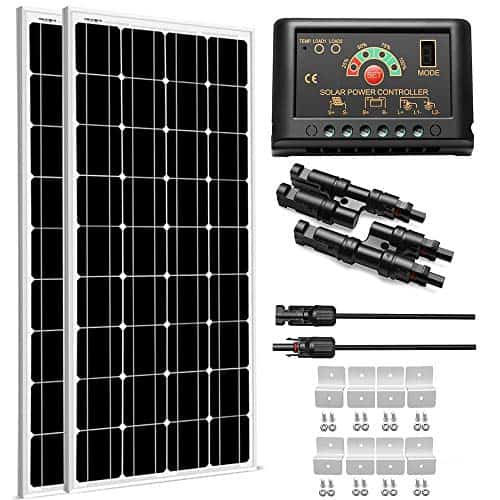
- Wattage: 100W
- Voltage: 12V
- Weight: 41.8LB
- Dimensions: 50 * 24.8 * 3.1inch
- IP67 Rated waterproof solar panel connectors
This SUNGOLDPOWER solar kit has a little higher price tag but is still a terrific starter package.
The panels themselves have a 25-year guarantee, so even if it just comes with two panels, a power controller, mounting brackets, and other cables and connections, it does have an excellent warranty.
The remaining components, however, are only covered for a year.
Given that these monocrystalline panels are of the highest caliber and efficiency, the guarantee is very welcome.
Additionally, SUNGOLDPOWER’s customer service is really helpful and quick to respond; it’s always better to deal with a dependable, amiable firm.
#7. ECO-WORTHY 120W Kit
Specifications
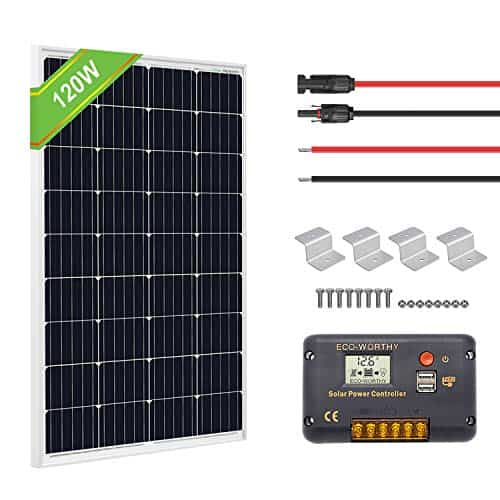
- Wattage: 360W
- Voltage: 12V
- Dimensions: 39.2*26.2*1.4inch
This 120W kit from ECO-WORTHY is compact and has a rather low power output, but it is also reasonably priced.
A single panel, a PWM controller, mounts, and connections are included in this kit.
Despite being somewhat cheap and compact, the solar panel is effective and could even surpass comparable products.
The package includes a surprisingly large number of brackets and connecting materials, more than enough for a straightforward, single-panel setup.
#8. WindyNation 200W Kit With 200ah Battery
Specifications
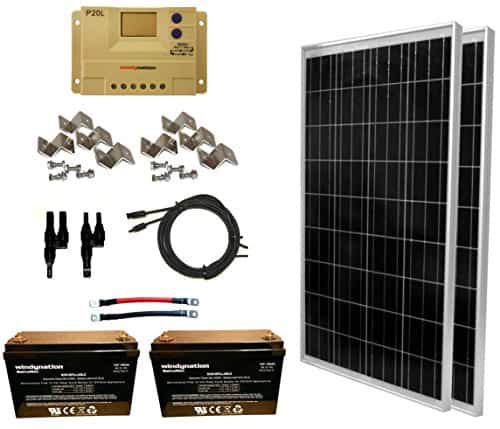
- Wattage: 820 Watt
- Voltage: 24 v
- Battery Capacity: 200mAh
- LCD Display: Yes
The #3 kit we previously examined is comparable to this smaller kit from WindyNation, although on a smaller size.
The cheaper price of this kit comes at the expense of fewer panels, an outdated PWM controller, and no inverter.
You can’t dispute the advantages of getting (nearly) everything you need in a single kit, however, and WindyNation dominates that market segment.
The controller’s use instructions are unfortunately out of current since this device is a little older, but it generally works as it should.
#9. XINPUGUANG 600W Kit Flexible Solar Panel Kit
Specifications
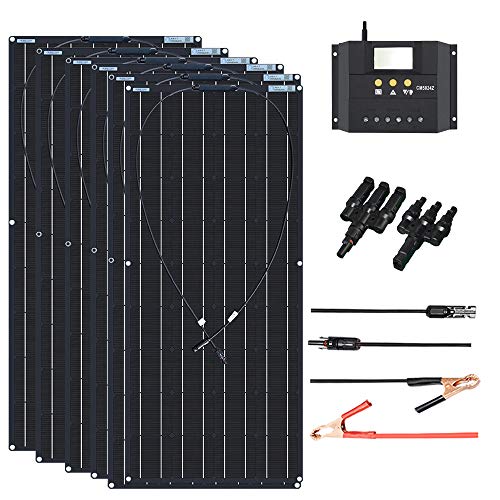
- Number of Panels: 6pcs 100W Flexible
- Wattage: 100w
- Voltage: 18V
- Weight: 2.2kg per piece
- Dimensions: 1175X540X3mm
The first flexible panel to appear on our list is included in this solar panel kit from XINPUGUANG, making it special.
With no need for brackets, flexible solar panels like these are among the simplest to install of all solar panel kinds.
Six flexible monocrystalline panels, connections, wires, and a controller are included in the 600W solar kit.
Our favorite feature of these panels is their weight, which is 80% less than that of glass panels, according the maker.
#10. Renogy 200W Kit With 30A PWM Controller
Specifications
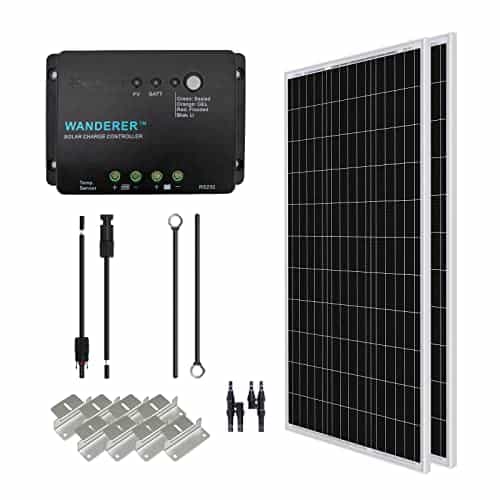
- Number of Panels: 200 Watt 12 Volt Monocrystalline
- Wattage: 1000Wh
- Voltage: 21.6V
- Battery Capacity: 50amp
For individuals who wish to start using solar power but need a little more than just a single 100W solar panel set, this 200W kit from Renogy is a great mid-tier package.
Sadly, the two panels that are included with this set don’t appear to be enough to warrant the cost.
Additionally, the controller is a little odd since it doesn’t display voltage or current.
However, since they are Renogy products, you can be sure that they will be effective, high-quality panels.
#11. WindyNation 400W Kit With 400ah AGM Battery
Specifications
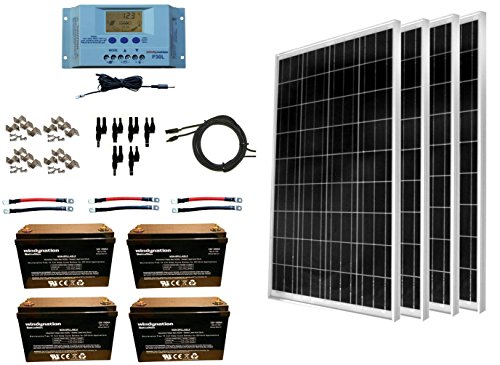
- Number of Panels: 4pcs 100W Solar Panels
- Wattage: 1700 Watt hours
- Battery Capacity: 400ah
- LCD Display: Yes
Another pricey turn-key kit from WindyNation, but for the cost, you get everything you need to get going right away.
The one thing to bear in mind is that because this kit lacks an inverter, it cannot be used with anything that runs on AC rather than DC power.
Aside from that, this is a very nice kit that is straightforward, simple to use, and quite trustworthy.
A controller with an easy-to-read LCD screen is also included in this package.
This is a welcome improvement over earlier screenless versions, making it simple to read and understand what’s happening with your solar installation.
#12. WindyNation 200W Kit With 200ah Battery And Inverter
Specifications
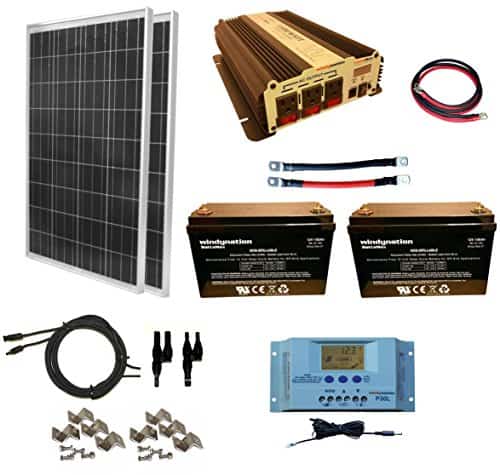
- Number of Panels: 2pcs 100 Watt Polycrystalline
- Wattage: 1500
- Voltage: 12v
- Battery Capacity: 200ah Battery
- LCD Display: Yes
This kit is very identical to kit #8, the 200W kit we previously examined, except this one includes a bonus inverter in addition to the plug-and-play kit.
This upgrade is not essential if you already own an inverter or would prefer to purchase a less expensive one separately since the inverter practically doubles the cost of this kit.
Despite the fact that this kit is great overall, take in mind that fuses are not included.
There is no indication in the product description that you will need to buy more fuses if you wish to add them to your installation.
#13. Renogy 400W Kit
Specifications
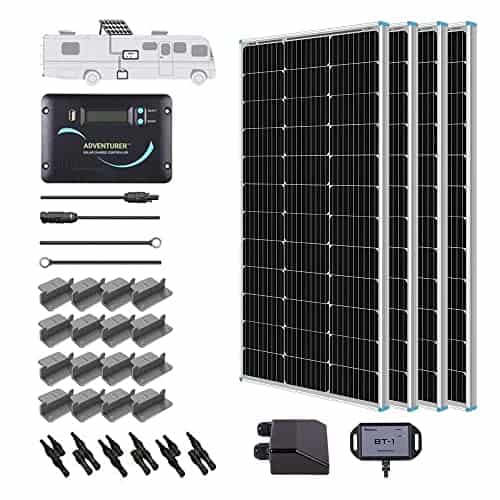
- Panel Type: 400W Monocrystalline
- Wattage: 2000Wh
- Weight: 88 pounds
- Bluetooth Module Compatible: Yes
- Dimensions: 42.2 x 19.6 x 1.38 inches
The 400W solar kit from Renogy is a pricey, more effective version of the Renogy kits we’ve previously seen.
This kit is quite “smart” since it also has an optional Bluetooth module that allows you to connect to the Renogy app.
Although the Bluetooth connection is strong, we wouldn’t advise any plans to rely on the Renogy app for setup or diagnostics since it sometimes has problems, which may be quite aggravating.
Although the kit is missing fuses and flanges, everything is of the same high caliber that you would expect from Renogy.
#14. ECO-WORTHY 800W Complete Kit
Specifications

- Solar Panel: 4 pcs 195W Solar Panel
- Wattage: 3000W
- Voltage: 24V
- Dimensions: 58.3*26.3*1.4 inch
- LCD Display: Yes
The all-in-one (or, more precisely, two-in-one) inverter-controller that comes with this full solar system from ECO-WORTHY sets it apart from the competition.
Space is somewhat conserved by merging the inverter and controller into a single device, but if you store the controller out of the way, it can be more difficult to get to it.
This kit unfortunately takes a little longer to put together than its relatives due to its unusual design, but it has a lot of promise if you have the necessary skills.
Our article on how to install a power inverter in a camper might help you fully understand your final setup once you’ve installed your solar panels.
#15. ECO-WORTHY 200W Kit
Specifications
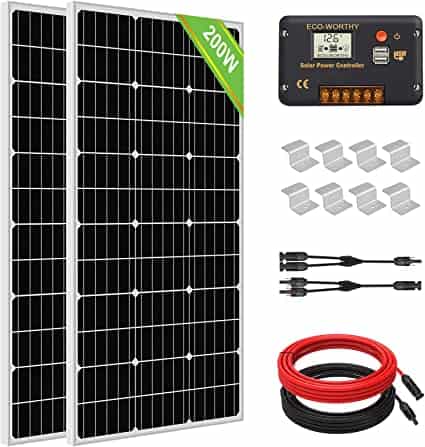
- Number of Panels: 2 pcs 100W mono solar panel
- Wattage: 100W
- Voltage: 12V
- Weight: 18.96 Pounds
- Dimensions: 41 x 21.75 x 3.5 inches
This two-panel solar kit from ECO-WORTHY includes everything you need to get started.
It is reliable and consistent despite having certain power and expansion limitations.
To correctly update your system if you want to add additional solar panels, you must understand how to choose a solar charge controller.
Unfortunately, the instruction booklet for this kit is a little ambiguous, making it difficult for novices and beginners to set up.
But if you have a little perseverance or knowledge, this kit probably won’t let you down.
#16. TP-solar 100W Foldable Kit
Specifications
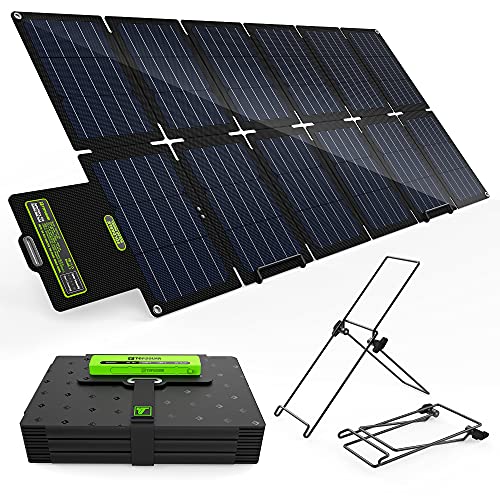
- Number of Panels: 100 watt foldable solar panel
- Voltage: 12 volt
- Weight: 5.1 LB
- Dimensions: 11*7.8*2.9 inch
There are a few reasons why this is the first (and only) kit from TP-solar that we have seen on this list.
For starters, this solar system is not intended to fully power an RV.
Similar to our best-rated portable solar panels, it is portable and easy to set up, but it is just intended to charge one battery or a small number of items, not a whole camper.
If your solar demands are minimal, however, this kit is reasonably priced for such a portable item and serves as a small, portable device that you can bring with you when you go hiking or camping.
#17. Renogy 200W Foldable Kit
Specifications
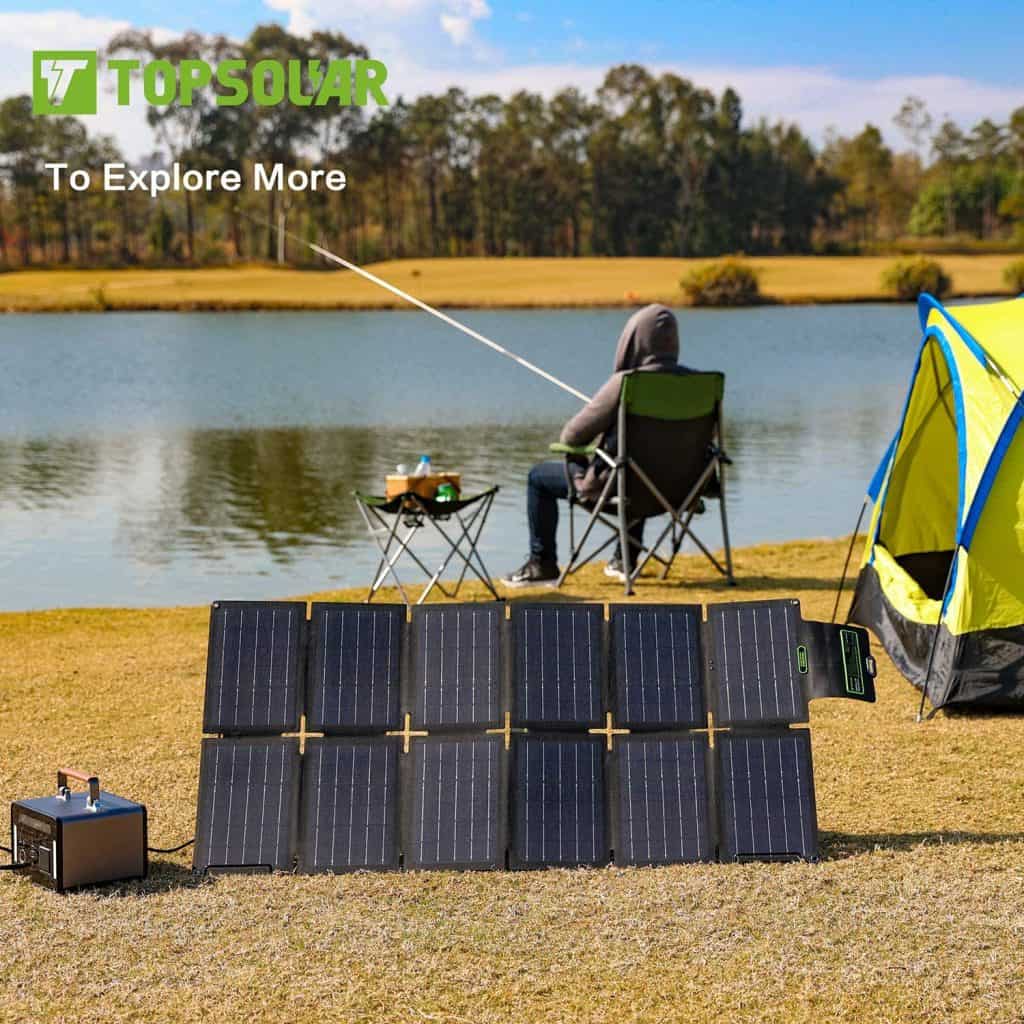
- Panel Type: 100W Foldable Solar Panel
- Voltage: 12v
- Weight: 5.1 LB
- Dimensions: 11*7.8*2.9 inch
This unexpected folding kit from Renogy is a little different from what they have previously offered.
As implied by its name, this device is foldable and portable, so when you need it, you can set it down on the ground, a pole, or another surface outside your RV.
You may then bring it back inside when you travel.
This solar kit is great overall, however there are a few limitations.
First of all, you receive less electricity for your money with temporary panels, and secondly, it’s a bit of a hassle.
Buyers’ Guide: Top 8 Tips for Picking the Ideal RV Solar Kit
Still having difficulties deciding which RV solar system is best for you? We advise beginning by responding to these eight questions.
#1. Determine the Solar Needs of Your RV
Determine how much electricity your RV consumes daily before you even think about investing in a solar panel (or numerous panels).
Before you even buy your solar installation, you may get a better understanding of the cost by calculating your energy requirements.
For instance, if you use a lot of power, you could need more batteries and solar panels than someone who mostly uses propane.
You should check the wattage consumption of each gadget you have in your RV if you need an exact figure.
If you wish to reduce your overall wattage draw, you may then think about moving to equipment with reduced energy requirements, such as a refrigerator driven by solar energy.
For a detailed look at this procedure, you can also read our tutorial on how much solar power you need for an RV.
#2. Recognize the Three Available Main Types of Solar Kits
Not every solar kit is made equally.
This is particularly true for RVs, whose size and power output vary greatly.
But apart from size and the quantity of batteries you have on hand, your solar panels’ output and cost may also be impacted by the sort of photovoltaic cells they include.
Amorphous
A more recent photovoltaic innovation are amorphous solar panels.
A thin layer of many silicon crystals makes up an amorphous solar panel.
These solar panels are sometimes less prone to damage since they are flush with the RV roof, but they also tend to wear out more quickly.
Amorphous solar panels are more portable than other varieties but have a little lower efficiency.
Monocrystalline
The most effective kind of solar panel is monocrystalline, but they are also often the most costly.
The cells in these panels are composed of a single crystal rather than numerous, as the name indicates.
In low light, monocrystalline solar panels perform very well.
Polycrystalline
As you may have suspected, polycrystalline solar panels are identical to monocrystalline ones, with the exception that each cell in a polycrystalline panel has many crystals as opposed to a single crystal.
Polycrystalline solar panels are often less expensive than their monocrystalline counterparts since manufacturing them is simpler, but they are also somewhat less efficient.
#3. Take Your RV Solar Kit Mounting Into Account
For a fixed residence, choosing where to install your solar panels is rather simple.
Where would they get the greatest exposure to the sun? This isn’t the true for RVs, however, since depending on where you are and when it is, you may get varied quantities of sunshine.
The size and form of your RV are two more variables that could be relevant.
RV Static Solar Kit
RV solar kits that are stationary are intended to be attached and then left alone (or as little as possible).
These kits are of the “set it and forget it” kind.
A fixed RV solar kit has clear advantages.
It can even charge your batteries while you’re on the road and doesn’t need setup every time you visit a new site.
To avoid damaging them while operating and parking your RV, you must take additional precautions, and you may find it difficult to move them about to get the most sun exposure.
Kit for Flexible RV Solar
As its name suggests, flexible solar panels are lighter and less rigid than conventional solar panels.
These panels are stick-on types that often cling to your RV like tape and don’t need a difficult installation.
Although these solar panels are relatively simple to install, they don’t generate as much electricity and tend to wear out more quickly.
RV Folding Solar Kit
Between stiff solar panels and flexible solar panels, foldable solar panels strike a wonderful, happy middle.
Although most of these solar kits are stiff, there may be one or more spots along the panel where they may fold.
They make fantastic “temporary” solar panels that rest on the ground or on a stand rather than being permanently affixed to your RV since they are much simpler to store and move.
RV Wind and Solar Kit
Wind and solar RV kits, as you may have guessed, combine the advantages of solar panels with the aid of an energy-producing wind turbine.
You have a little more freedom with wind and solar combo kits since you can keep producing power even on windy, overcast days.
#4. When in doubt, choose bigger than smaller (for Wattage, and Battery)
Despite how beautiful solar panels are, we have not yet developed the technology to make them completely efficient.
The most effective solar panels available today have an efficiency of between 15 and 20 percent, with some even going a little higher.
In other words, only 15–25% of the energy that is absorbed by your solar panels is effectively transformed into electricity.
As a result, it’s always preferable to oversize your solar panels if you’re torn between doing so and undersizing them.
You won’t likely be able to generate more electricity than you use unless your RV is parked continuously in one of the sunniest regions of the planet.
(Oversizing your batteries also plays a role in this.)
You’re considerably more likely to meet your anticipated energy demands by significantly overestimating your power and battery requirements.
#5. Take Your Solar Kit’s Expandability Into Account
The solar panels and the batteries make up the two primary parts of an RV solar system, which in this instance we’ll assume is off-grid.
As you are aware, the batteries store the energy that the solar panels capture from the sun.
Your controller must appropriately feed the energy to the batteries before it can be stored.
The size of your RV solar system is restricted by the controller’s capacity.
No matter how rapidly your solar panels gather energy, if your controller can’t swiftly direct the additional, it will be lost.
As a result, you may want to think about whether your existing controller can manage the load if you plan on installing additional solar panels in the future.
#6. Take Into Account the Solar Charge Controller Type You Want
The solar charge controller is a vital aspect of your RV solar system that shouldn’t be disregarded.
A solar charge controller’s main job is to keep an eye on your batteries and manage how much electricity is supplied to them at any one moment.
For instance, your batteries shouldn’t be given any extra energy after they are fully charged; doing so is risky and will hasten their wear and tear.
There are two primary categories of solar charge controllers: MPPT, which is a more recent and sophisticated protocol, and PWM, which is an earlier and simpler protocol.
The advantages of each of these methods are discussed below.
MPPT (New)
The variable procedure known as MPPT, or Maximum Power Point Tracking, allows your solar panel to operate at its maximum voltage before being accurately converted to the level that your batteries can handle.
While more costly and intricate, MPPT controllers are compatible with a wider variety of panels and batteries.
PWM (Old)
While MPPT protocol is more mild and straightforward than PWM protocol, the latter is less effective.
If you want your solar panel and batteries to operate at their full potential, they must be compatible since PWM controllers do not convert the resultant voltage.
#7. Seek out supplementary features that excite you
Which amazing features would you most want to see in your RV’s solar kit? should go without saying.
You can learn a lot about portability, durability, cost, and other elements of having an RV solar kit by reading reviews on RV solar kits, but you could miss out on some of the more enjoyable parts.
In particular, if these features drive up the cost of your solar system, you don’t need to go out on every extra function.
But it’s a good idea to utilize them at the very least to focus your search.
For instance, a few of our preferred extras from this list are:
- A wind turbine integrated for further power
- Batteries are included
- The kit’s capacity to operate parallel or in series
- Bluetooth support for in-app command
- Transferable and ongoing warranties
- A nice and cordial client service
- Folding or flexible panels
- Status-displaying controllers for quick troubleshooting
- A plug-and-play system (i.e., you can install it and use it instantly)
- Separate controllers and inverters vs.
- An all-in-one
#8. Discover the Best Offer for You
We’ve finally reached the most important section: the cost of your RV solar system.
While making decisions based on size and features is fine and wonderful, you won’t succeed if you can’t ultimately afford it.
Be careful to take into account the kit’s long-term cost, any possible tax and/or sales incentives, and any energy savings.
Warranty
The warranty on your RV solar system may affect the overall cost over time if you wind up having durability issues.
The warranty that comes with the solar panel kit you purchase will depend on its size, quality, and kind, but you may also have the option to get an additional warranty if you so want.
Time-Limited Offers
For the best savings on high-quality solar kits, look for limited-time offers.
Despite the fact that these offers might change at different times of the year, one of the greatest seasons to buy solar panels is, unexpectedly, in the winter.
Since the spring and summer months are when most people choose to purchase solar panel kits, the winter season might be sluggish, which means greater offers and incentives for you.
Final Cost
When acquiring solar panels for RVs, keep in mind that unique reductions, such as tax credits, may have a big influence on the total final price you spend.
For instance, the Solar Investment Tax Credit, or ITC, was implemented in 2006 and is still in place today.
This tax credit might have paid for up to 30% of your solar purchase in 2019, but by 2021 it would have only covered 26% of it.
The tax credit is anticipated to decrease once again in 2021, to 22%.
FAQs
Do you still have concerns about buying a solar system for an RV? If so, don’t worry! The most often asked questions to be aware of before purchasing one are listed below to help you in your search.
Are RV Solar Panels Worth It?
For an RV, solar panels may definitely be worthwhile.
Solar panels are particularly well-suited to RVs because of their off-grid capabilities, despite their high initial cost.
RVs and solar panels work really well together because of how little electricity they need.
Solar panels not only save your power costs but also provide you access to more remote camping sites.
That, in our view, makes them worthwhile only for the lifestyle benefit.
What RV Solar Kit Is the Best?
Although the finest RV solar kit for you will depend on your requirements, we believe the ACOPOWER 500W Kit to be the best.
This kit is excellent for almost everyone since it is not only inexpensive, large, and strong, but it is also simple for novices to use.
Can Solar Power Power My RV AC?
Yes, technically, to the aforementioned query, but air conditioners use a lot of power.
To operate your RV AC solely on solar power, a lot of solar panels and batteries would be needed.
But you also have a lot of additional choices to think about, including fans, evaporative coolers, and even propane-powered air conditioners.

